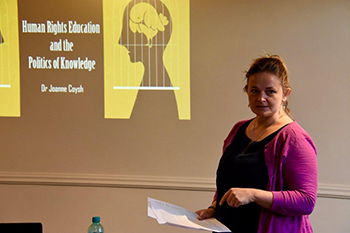
Dr Joanne Coysh and Dr Sahar Sattarzadeh attend the
launch of Human Rights Education and
the Politics of Knowledge.
Photo: Luis Escobedo D’Angles
Dr Joanne Coysh is a multi-talented individual who has designed, facilitated, and accompanied participatory processes for research, learning, and change. She is also a postdoctoral research fellow from the University of Warwick, in the UK, and is working at the Institute for Reconciliation and Social Justice (IRSJ) at the UFS. Dr Coysh’s book, Human Rights Education and the Politics of Knowledge, was launched at the Centenary Complex on the Bloemfontein Campus by the IRSJ on 15 August 2017.
Connecting theory with practice
In the book, she argues that the traditional ways in which human rights education is conducted often become an obstacle. Based on her work on participatory group processes, Dr Coysh is uniquely positioned to bring a different and more practical, even radical, angle to the process of human rights education. Her purpose with the book is to connect theory to practice in order to design processes through which people begin to take positive and transformative decisions and actions. These not only have the potential to transform lives but our relationships with each other and the world in which we live as well.
Teaching and learning from the bottom up
When working with individuals and groups, Dr Coysh believes that they should be engaged, enabled, and empowered throughout the process. Not only does she explore real problems in context, but when doing her work, she also believes in encouraging respect for existing research and knowledge.
Her international experience in education and working in communities has allowed her to integrate global best practices into local application, allowing her to explore the big picture as well as local context. Having mastered the art of balancing theory with practice, research with reality, and facilitation with integration, her book shows how this dance can turn human rights education into human rights transformation.